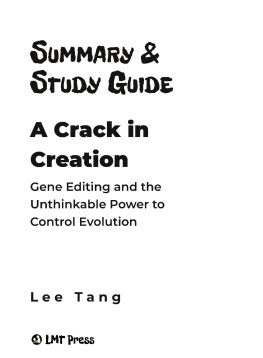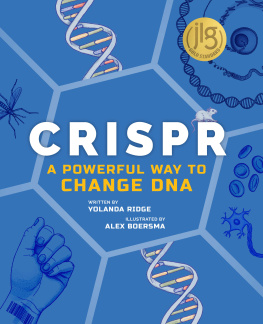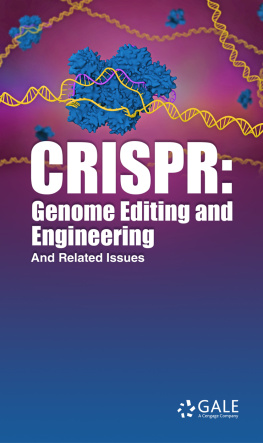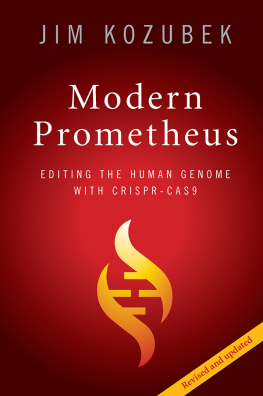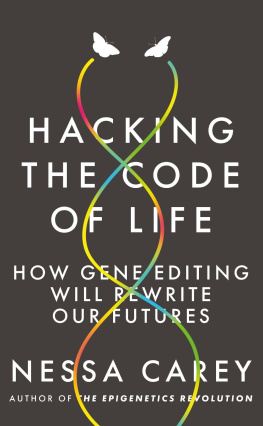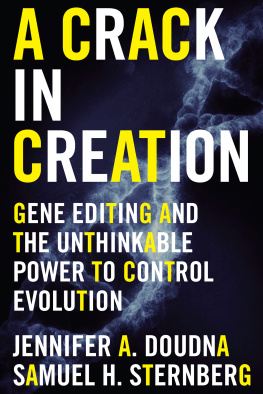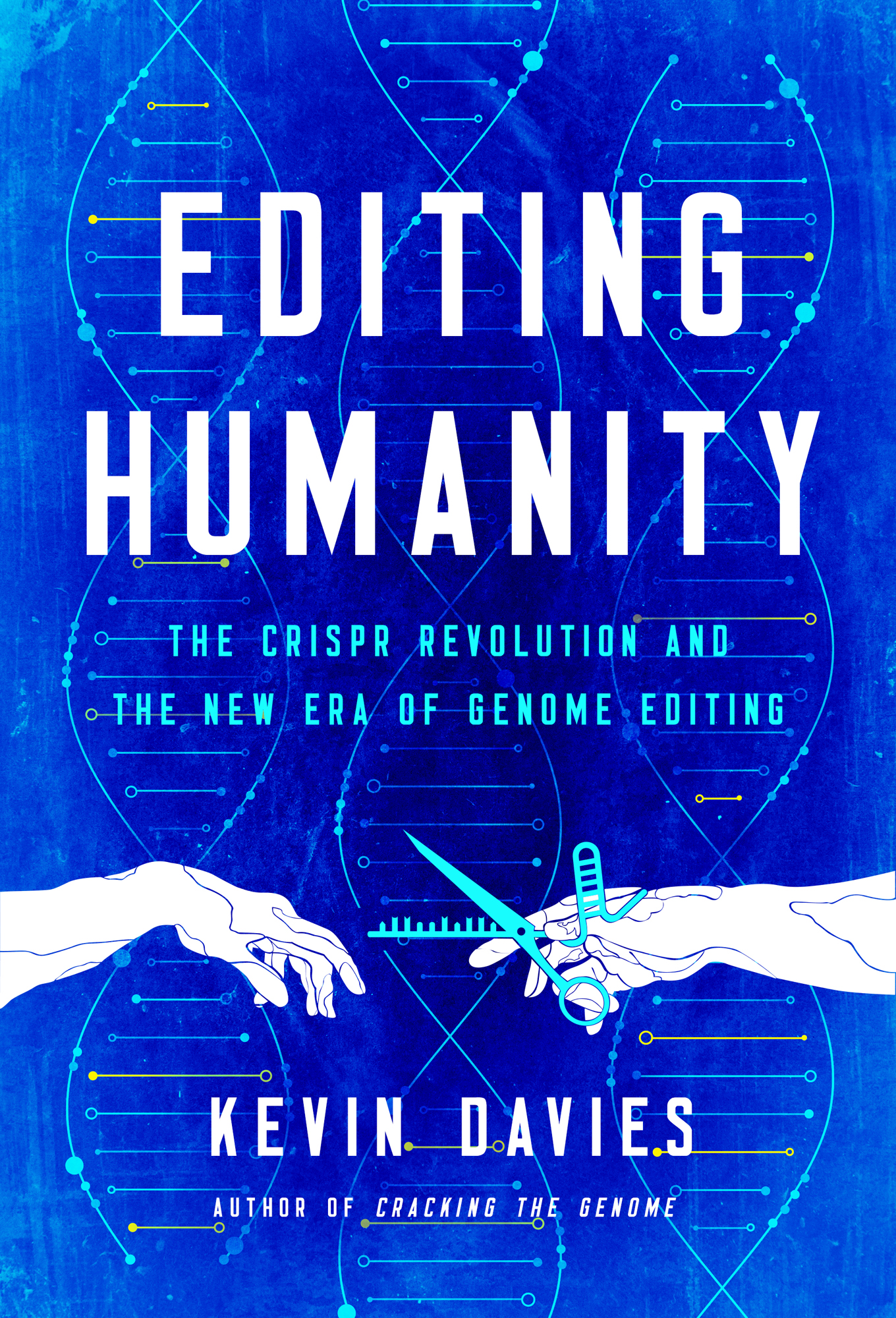Contents
Guide
To my parents
and
In memory of Michael White (19592018), author, musician, friend.
PROLOGUE
Thanksgiving weekend, November 2018: I settled in for a fifteen-hour flight from New York to Hong Kong to attend a scientific conference. It was a long trek for a three-day gathering of bioethicists, and I wasnt expecting any major fireworks. Even Alta Charo, a member of the organizing committee, worried it might be a really boring summit.
As we headed towards the Arctic Circle, I folded my laptop, ordered a Pot Noodle, and flicked through the in-flight entertainment menu before settling on an action film called Rampage. Following an explosion aboard the international space station, canisters containing a mysterious chemical crash to earth. Naturally, one lands in the San Diego Zoo, where Dwayne The Rock Johnson happens to work as a primatologist, contaminating his beloved albino gorilla, George. Two other animalsLizzie the crocodile and Ralph the wolfmutate overnight before converging on Chicago. This was all utterly ridiculous if mildly entertaining, but the material wreaking mutational mischief was the reason I was on this journey. Have you heard of CRISPR? Naomie Harris asks our chiseled hero.
He hadnt. Nor indeed had I until a few years earlier. The summit in Hong Kong was the sequel to a gathering in 2015 in Washington, DC, to discuss the ethics of human genome editing. The debate had been prompted by the emergence of a revolutionary technology for fixing or modulating genes with a catchy acronym: CRISPR. Earlier that year, scientists in China had altered the genes of a human embryo in a dish for the first time. It was a preliminary experiment on non-viable embryos (no women were pregnant), but it sparked fears that someone, somewhere might attempt to rewrite the genetic code of the human species. One of the undisputed pioneers of the gene-editing technology, Jennifer Doudna, called for international debate on how this technology should be used, whether it should be restrained, or even banned altogether. The chair of the DC conference, Nobel laureate David Baltimore, referenced Brave New World to warn that we were facing the prospect of new and powerful means to control the nature of the human population. Three years later, I presumed many of the same characters would be sounding similarly abstract warnings.
I landed in Hong Kong in the early afternoon of Monday, November 26, and turned on my phone. As I scrolled through Twitter, it took a few seconds in my groggy state to register what I was reading. A science reporter named Antonio Regalado had published a sensational scoop that a Chinese scientist was overseeing the pregnancy of a gene-edited fetus. It strongly suggested that babies genetically altered using CRISPR might already have been born. #CRISPRbabies was trending.
There was more: in a series of YouTube videos, a thirty-four-year-old Chinese scientist named He Jiankui described his historic feat. Two beautiful little Chinese girls, named Lulu and Nana, came crying into this world a few weeks ago, he said in halting English. The girls are home now, with their mom Grace, and their dad, Mark. The name He Jiankui didnt mean anything to me but he was due to speak at the conference. Would he still show up? Would the organizers allow him to appear?
Two days later, He Jiankui did indeed try to explain what he had done, and more importantly, why. It was one of the most intensely watched scientific presentations in history, in front of hundreds of journalists and press photographers and close to two million viewers of the live webcast. And I had a front row seat. As He Jiankui entered the packed auditorium and walked across the stage, the only sound was the staccato clatter of about two hundred camera shutters. On social media, an American scientist was screaming this was a travesty and that the organizers were crowning a science celebrity. On the contrary, I felt we were watching a dead man walking. Indeed, by the time He Jiankui had left the stage and returned home to Shenzhen, his dreams of fame and national glory were in tatters. Instead, he faced house arrest, ignominy, and, one year later, prison.
The #CRISPRbabies story marks an extraordinary turning point in human history. Theres a reason that the Ken Burns documentary The Gene, based on Siddhartha Mukherjees superb book of the same name, opens with a colleague of He Jiankui injecting CRISPR circumspectly into a human embryo. The baby crisperer, as the Economist dubbed him, had wrested control of heredity from nature, at least for one of the 20,000 genes that make up the human genome.
It was just fifteen years earlier that an international consortium of scientists completed the Human Genome Project (HGP), piecing together more or less every page of the book of life, a script of 3.2 billion letters comprised of a four-letter alphabet. A group of researchers at the University of Leicester printed the complete sequence as an encyclopedia of more than one hundred volumes, each chromosome bound in a different color. Those volumes of information are miraculously bundled into twenty-three pairs of chromosomes that reside in trillions of cells in your body. With the human genome sequence at hand, scientists could set about identifying the genes that go awry in literally thousands of rare hereditary diseases, as well as the DNA variants or misspellings that shape our predisposition to common diseases like diabetes, heart disease, and mental illness. Even before this genetic revolution, researchers dreamed of using specific DNA sequences as gene therapy, injecting healthy genes into patients cells to compensate for the faulty genes. But the idea of performing DNA surgeryfixing broken genes by cutting and pasting DNA directly into a patients genomewas a fantasy.
All that changed when the CRISPR craze erupted in the summer of 2012. Two scientistsFrench microbiologist Emmanuelle Charpentier and Doudna, an American biochemistpublished a groundbreaking discovery. They stood on the shoulders of many researchers around the world who had been toiling out of the public eye to understand the biological purpose of CRISPR. These Clustered Regularly Interspaced Short Palindromic Repeats (the official acronym) were known to be the critical component of a natural bacterial immune system, a microbial missile defense shield to neutralize attack by certain viruses. Researchers in the Doudna and Charpentier labs reconfigured the molecular machinery to produce an ingenious method for precisely targeting and cutting genes and other DNA targets. Six months later, several groups, led by Feng Zhang at the Broad Institute and George Church at Harvard Medical School, showed that the DNA of mammalian cells could be edited using CRISPR. The prospect of being able to precisely edit almost any sequence of DNA, be it human, bacterial or of any other organism, was extraordinary. CRISPRs ease of use was unlike anything seen beforea technical if not conceptual breakthrough that would transform science and medicine, and perhaps the very fabric of humanity.
Thanks to these researchers and many other scientists around the world, we can now exercise control of heredity with unprecedented ease and precision. We can erase or rewrite disease genes, one person or embryo at a time. We can change the genomes of livestock, plants, and parasites to improve the lives of millions of people, especially in developing countries ravaged by climate change. We can save species from extinctionand maybe even re-create some that have already left this mortal coil. And although we dont know nearly enough about the complexity of the gene networks that underpin our predisposition to diabetes, heart disease, and mental illness, let alone shape our behavior, personality, and intelligence, we can imagine a day when we might be able to augment or manipulate some of those characteristics, too.


